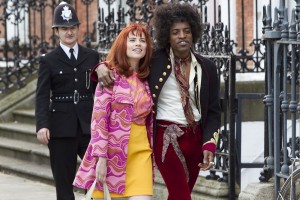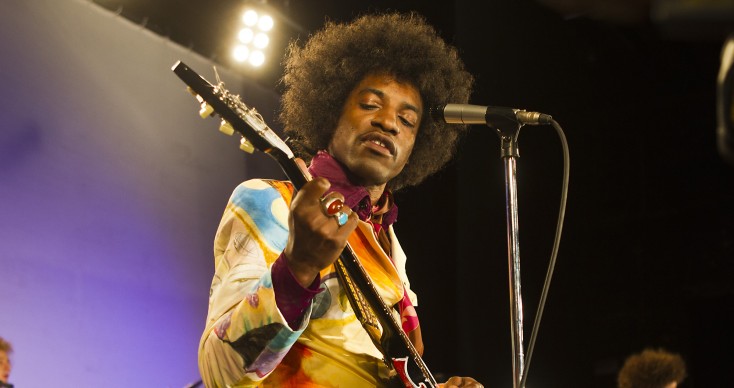
(L-R) Hayley Atwell as Kathy Etchingham and André Benjamin as Jimi Hendrix in the drama/biopic “JIMI: ALL IS BY MY SIDE.” ©XLrator Media. CR: Patrick Redmond.
****NOTE TO EDITORS: Foul language has been asterisked. You may want to edit accordingly.****
By ANGELA DAWSON
Front Row Features
HOLLYWOOD—Musician/actor Andre Benjamin a.k.a. Andre 3000, returns to the big screen playing legendary guitarist and singer Jimi Hendrix in “Jimi: All Is By My Side.”
Benjamin was born in Atlanta in 1975, five years after Hendrix died of a drug overdose at age 27. The product of a different generation, he doesn’t recall hearing Hendrix’s distinctive and much-copied rock and R&B sound until he was in his 20s.
“I was into rap and sports,” the founding member of the hip-hop duo OutKast reveals of his childhood passions.
He says he thinks he first heard the famed guitarist while watching a movie, though he can’t specifically recall which movie it was. With similar features and sharing a similar build to Hendrix, not to mention having music skills, it comes as no surprise that Benjamin had been approached before about depicting the world-famous musician, but it wasn’t until he was contacted by the film’s writer-director John Ridley, who won an Academy Award for his “12 Years a Slave” script, that he gave the idea serious consideration.
Known primarily as a Grammy-winning music artist, Benjamin acted in the underrated musical “Idlewild,” “Four Brothers” and “Be Cool.” But the challenge of depicting on film one of the most iconic music figures of the 20th century was both frightening and also tempting to him.
The 39-year-old spent more than seven months rehearsing with a coach to sharpen his guitar-playing skills enough to convince moviegoers he was Hendrix onscreen. Making that task even more challenging was the fact that Benjamin is right-handed and Hendrix was left-handed. While the filmmakers considered allowing Benjamin to play right-handed and then flip the negative, the cost of making those changes digitally proved prohibitive, so Benjamin simply learned to play left-handed, while making it look effortless and dressed up to look like the rock legend.
Unlike most biopics, which frequently span a performer’s life, “Jimi: All Is By My Side,” confines its story to 1966-67, a seminal period in which an unknown backup guitarist playing New York’s Cheetah Club moves to London where he storms the local music scene. While there, he becomes involved with three very different women: posh talent scout Linda Keith (Imogen Poots), sexy groupie/girlfriend Kathy Etchingham (Hayley Atwell) and Ida (Ruth Negga), a sly interloper who vies for the guitarist’s affection.
Benjamin says it was the story of Hendrix’s struggle to become a professional musician that he identified with and wanted to explore.
Q: What sets “Jimi: All Is By My Side” from other biopics?
Benjamin: What’s important about this one is that we get to see a little more of the person, the human side of Hendrix, which is really important in a lot of artists’ lives. Because I’m an entertainer myself, I know how important that is: the people around you, the people that support you, and the people that nurture you. Hendrix definitely wouldn’t be Hendrix if it weren’t for the people around him. That’s what this movie’s about. What resonates with viewers is seeing the human side of an artist, knowing Hendrix was nervous, knowing he didn’t like his voice, that it actually took a minute for him to get comfortable.
Q: Of the footage you watched of Jimi, what stood out for you?
Benjamin: There’s footage on YouTube of his first performance in Paris—it’s black and white footage—and he’s rolling around on stage, but it’s not as cool as it looks at Monterey, so it took him a minute to learn and get the confidence. As humans, we like to say, “He’s just like me.” We put him up there (on a pedestal), but he had to get there first.
Q: This drama follows Hendrix’s journey during the year he broke through. Was there a year like that for you?
Benjamin: I know from being an entertainer for 20 years how people approach me. I know what people write about me. I know when people see me on the street what they say, and they put you up here. But, the whole time, I just know I’m this kid doing the music that I love doing. I’m not thinking this is just how people perceive you. So, it’s like, I can’t say what that date was for me. I can’t look back now and say, “Whoa, those were a few great years,” because it’s now 20 years later. When you’re in it, you don’t really know what’s going on, so I can’t pinpoint a date.
Q: What was the first exposure you had to Jimi Hendrix?
Benjamin: I discovered Hendrix maybe in my early 20s. That was the first time I’d ever heard a Hendrix song. I heard these crazy solos and, from that point on, I was just a Hendrix fan. Once I picked up the guitar myself, I wanted to know other African-Americans that were playing and, of course, Jimi came across. It’s funny, as a kid, you just knew Jimi as this black man that nobody understood. That’s all you really knew. You didn’t know his music, really. You just knew of this image of a dude.
Q: You do a good job of imitating his guitar playing style in the film. How long did you have to play those riffs?
Benjamin: To be honest, it’s funny that you say that. I’m a **** guitarist, man. Honestly, I’m a right-hand guitarist. I’m more a punk guitarist more than anything. I just play loud and fast.
Q: You’re right-handed and you had to learn how to play left-handed because Jimi was left-handed. Was that tricky?
Benjamin: I remember having a conversation (with John) a couple of days before we left for Ireland (telling him I wasn’t comfortable playing left-handed). Another thing about the left hand thing, and I think any guitarist would agree, was that Jimi was the most comfortable-looking guitarist in the world. Most guitarists, even if they’re great, look like they’re doing a task, like they’re working. But Jimi never looked like he was working. It always looked like he had an extra hand. But John said to me, “The way we shoot it, you’ll be OK.”
Q: Was there anything that surprised you when you did your research?
Benjamin: There were two things, actually. Hendrix was confident in his playing. He’s pretty ballsy. I’ve heard interviews where he was kind of talking ****about other players, not putting them down, but basically talking about his skill versus their skill. He also was just remorseful about what he had said. There was a time—and you see it in the movie—where Hendrix has to go on stage and play with (Eric) Clapton. Later on, there’s an interview with Hendrix where he says, “Oh, man, I hate that that actually happened, because I love Clapton and I really love his playing. I would love to play with Clapton every day, but I knew at that point that it came down to him or me. I knew walking onto the stage I would have to burn him to make it.” (He laughs.) So, you get to see his human too. There’s another great thing I learned about him, and I think kids should hear this. Everyone knows Jimi as this drug addict kind of guy. But there’s an interview where Hendrix says, “I used to think I was built to take all these drugs,” and then he says, “I know now that I’ve taken entirely too many drugs.” He said it. It’s just another side of somebody that you think is high all the time and didn’t give a ****.
Q: As a music artist, what’s it like to play another musician?
Benjamin: It was scary. People ask me about what’s it like trying to find the essence of Hendrix, and I don’t know if I actually nailed it. I just knew John said, “Whatever you do, just own it. We have to be honest. We’re doing trickery here.” I will never be Hendrix. John said to me early on, “You’ll never be Hendrix but tell me your interpretation of him. Don’t give me this sideshow kind of thing. Just give me your Hendrix and give me the best one you can do.” So I just tried my best. I can’t say that I’m on a level with Hendrix. I can’t say that I’m spiritually connected to him or any of that kind of stuff. I just read as much as I could and did as much research as possible. And yeah, there are certain (similar) crossing points in our careers. I know what it’s like to be a nervous artist. I know what it’s like to grow as an artist. I know what it’s like to want full freedom in what you’re doing. I know what it’s like to want to fully throw yourself into music. I know what it’s like to want to look cool while you’re doing it. So there are points that (Hendrix and I) can agree on.
Q: You mentioned that you didn’t consider yourself an actor when you started this. How do you feel now?
Benjamin: I feel like a very lucky man. I don’t do a lot of movie work so when John approached, there was a little hesitance by me to do it. I’m more of an idealist. If I feel like it’s something that I can believe in as a whole and the outcome will be great, I’ll put my all into it. To be honest, I don’t think you necessarily have to be an actor to act, just as you don’t have to be a musician to make great music. If it comes along and you put your all into it, it’s the outcome that’s important. I still don’t consider myself an actor. I don’t go to classes and that kind of thing, but if I have a project that I’m interested in, and I need to go to classes, then I will.





